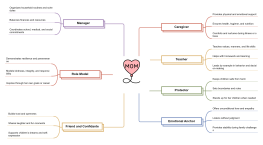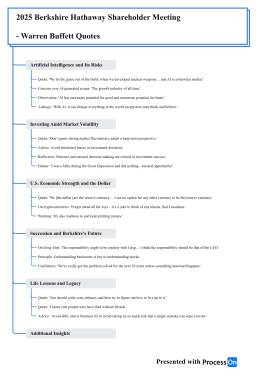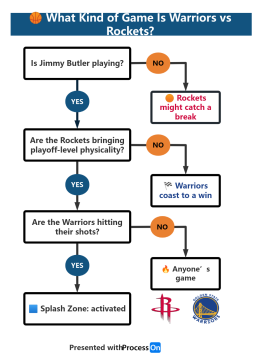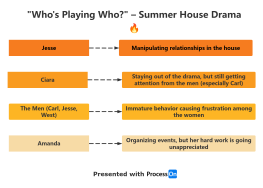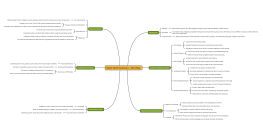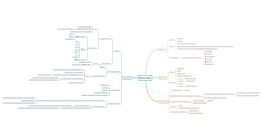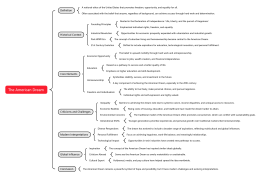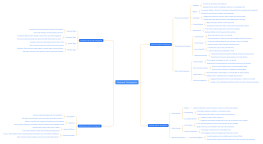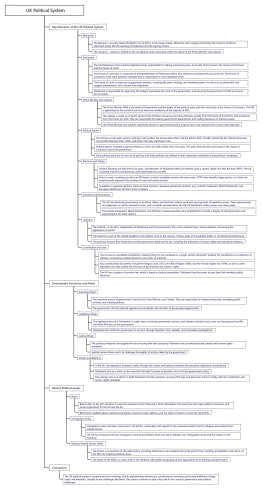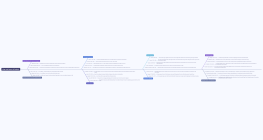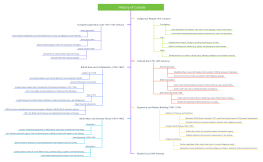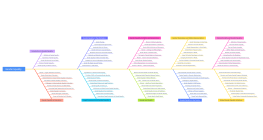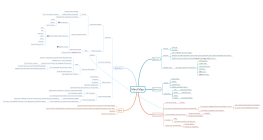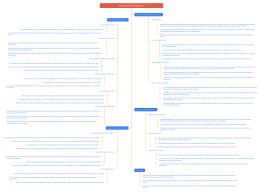1984 - George Orwell Mind Map
2024-12-06 19:16:49 208 2 Report 0
0
Login to view full content
This mind map serves as a comprehensive guide to George Orwell's seminal novel, '1984,' published in 1949. Set in a dystopian future in Airstrip One, Oceania, the story explores themes of totalitarianism, surveillance, freedom, and truth. The narrative follows Winston Smith, a low-ranking Party member, as he rebels against the oppressive regime led by Big Brother. Through his forbidden romance with Julia and subsequent betrayal by O'Brien, the novel illustrates the Party's psychological manipulation and control. '1984' remains a critical examination of authoritarian power, influencing discussions on privacy, surveillance, and political truth.
Other creations by the author
Outline/Content
Themes
Totalitarianism
1984 critiques the dangers of an absolute government that controls every aspect of society.
The Party’s domination of thought, history, and language reflects the destructive potential of totalitarian rule.
The novel demonstrates how totalitarian systems create a false reality, stripping people of their agency and individuality.
Surveillance
The Party’s pervasive surveillance system uses telescreens, microphones, and cameras to monitor citizens' every move.
The slogan 'Big Brother is watching you' serves as a constant reminder of the Party’s control over the individual.
The novel explores the psychological effects of constant surveillance, leading to a culture of self-censorship and fear.
Language and Thought Control
The Party manipulates language through the creation of Newspeak, a language designed to eliminate words that could foster rebellious thoughts.
Newspeak’s aim is to restrict the range of thought and make political dissent impossible by reducing vocabulary.
The concept of 'doublethink' allows contradictory beliefs to coexist, undermining objective reality and truth.
Psychological Manipulation
Winston’s psychological struggle and eventual breakdown reveal the power of the Party to control not only actions but thoughts.
Through physical and mental torture, the Party breaks Winston’s resistance and forces him to accept its version of reality.
The novel highlights the terrifying potential for psychological manipulation by totalitarian regimes.
Freedom vs. Control
1984 explores the conflict between personal freedom and the overwhelming force of totalitarian control.
Winston's rebellion represents the struggle for autonomy, while his eventual submission symbolizes the crushing power of the Party.
The loss of personal freedom is shown as inevitable in an environment where the Party has absolute control.
Symbols
Big Brother
Represents the Party's power and constant surveillance.
The face of Big Brother is displayed on posters, coins, and telescreens, symbolizing an omnipresent, authoritarian rule.
Telescreens
Monitors citizens' every action and thought, representing the Party’s ability to watch and manipulate them.
They act as both surveillance tools and mechanisms for Party propaganda.
The Paperweight
Represents Winston’s connection to the past and the idea of preserving memories in the face of Party control.
The paperweight is a symbol of Winston’s desire to retain his individuality and a tangible link to a forgotten world.
Room 101
Represents the ultimate form of torture where prisoners face their greatest fears.
For Winston, Room 101 is the place where he is mentally broken and forced to betray his love for Julia.
Impact and Legacy
1984 has had a lasting impact on global political discourse, particularly concerning the dangers of surveillance and censorship.
The term 'Orwellian' is now widely used to describe oppressive, surveillance-heavy governments.
The novel remains a cornerstone of dystopian literature, warning readers about the erosion of individual freedoms in the face of totalitarian power.
1984 has influenced modern discussions about privacy, data surveillance, and the manipulation of truth in politics and media.
Overview
Author: George Orwell
Published: 1949
Genre: Dystopian Fiction, Political Fiction
Setting: Airstrip One (formerly Britain), Oceania
Theme: Totalitarianism, Surveillance, Freedom, and Truth
Plot Structure
The novel is divided into three parts: 1. Winston's Rebellion 2. The Betrayal and Capture 3. The Re-education
The narrative structure shifts from Winston's growing dissatisfaction with the Party to his eventual brainwashing and submission.
Plot
Winston Smith's Rebellion
Winston, the protagonist, works for the Party in the Ministry of Truth, altering historical records.
He secretly despises Big Brother and the Party, yearning for a life of personal freedom.
Winston begins his rebellion by starting a forbidden love affair with Julia, a fellow Party member.
The couple seeks refuge from Party surveillance by renting a room above Mr. Charrington's shop.
The Party's Control
The Party exercises total control over all aspects of life, including thoughts, language, and history.
Big Brother, the Party’s leader, symbolizes the omnipresent authority of the state.
Winston’s job at the Ministry of Truth is to revise historical records, ensuring that they always align with Party propaganda.
The Party utilizes advanced surveillance technologies, including telescreens and the Thought Police, to maintain order.
The Betrayal
Winston and Julia are arrested after being betrayed by O'Brien, who pretended to be an ally of the resistance.
O'Brien uses psychological manipulation and torture to break Winston's will and force him to abandon his rebellious thoughts.
The couple's relationship is destroyed, and Winston ultimately betrays Julia under duress.
Final Outcome
Winston is tortured in the Ministry of Love and undergoes re-education to erase his subversive thoughts.
In the end, Winston is brainwashed into accepting the Party's control and comes to genuinely love Big Brother.
Characters
Winston Smith
The protagonist, a low-ranking officer in the Party who secretly opposes the government.
He represents the individual's struggle against oppressive regimes and the loss of personal freedom.
His journey from rebellion to submission underscores the theme of power’s ability to crush human spirit.
Julia
Winston’s lover and fellow rebel against the Party.
Represents personal desire and resistance to the Party’s repression.
Her pragmatic approach to rebellion contrasts with Winston’s intellectual struggle.
O'Brien
A high-ranking Party member who deceives Winston into believing that he is part of a resistance group.
O'Brien is a complex character representing the Party's manipulation of truth, psychological control, and betrayal.
He orchestrates Winston's torture and re-education in the Ministry of Love.
Big Brother
Symbolizes the Party’s omnipresence, surveillance, and authoritarian control.
Though he may not be a real person, Big Brother embodies the totalitarian state’s ability to control thought and perception.
Big Brother’s image is constantly displayed on posters, coins, and telescreens to remind citizens of his authority.
Emmanuel Goldstein
The supposed leader of the Brotherhood, a rebel group trying to overthrow the Party.
Goldstein is an elusive figure, constantly vilified by the Party as a traitor, representing the Party's scapegoat for all dissent.
His book, 'The Theory and Practice of Oligarchical Collectivism,' reveals the underlying mechanics of Party control.
The Proles
The working-class majority in Oceania, often seen as politically insignificant by the Party.
Although they live in poverty and ignorance, they are not subjected to the same level of surveillance as Party members.
Winston initially believes that the proles hold the key to overthrowing the Party, but he eventually realizes their apathy.
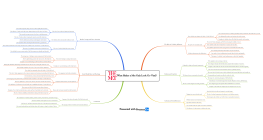
Collect
0 Comments
Next page
Recommended for you
More

